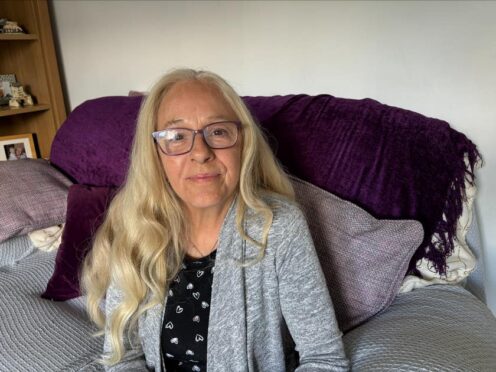A grandmother who was fighting for her life in hospital when a healthcare assistant fraudulently used her bank cards said she was in “absolute disbelief” that the worker could prey on her vulnerability.
Hazel Longhurst, 65, was a cancer inpatient at St Bartholomew’s Hospital in the City of London when 33-year-old Mira Solmaz, who was supposed to take care of her, used her cards in 2021.
There was around £1,660 worth of fraudulent purchases, City of London Police said.
Solmaz, of Mare Street, Hackney, east London, has been sentenced at Southwark Crown Court after admitting a series of offences including fraud, possession of articles for use in fraud and money laundering.
Retired palliative care nurse Ms Longhurst said she had worked in the NHS “my whole life” and “I couldn’t believe that someone like that could be employed”.
Ms Longhurst, of Rayleigh in Essex, said she had received text alerts from Tesco Bank warning of unusual activity on her account but initially thought they were a scam.

Her daughter Melanie Turner, 43, believed it was a phishing scam as she thought her mother’s cards were safely locked in a cupboard at hospital.
However, the bank sent a letter to Ms Longhurst warning of unusual activity, which was opened by Ms Turner who urged her mother to check that she still had the cards but they were not there.
Ms Turner said she tried to cancel the two cards – with Tesco Bank and Halifax – but as she was not the account holder and did not have power of attorney she was limited in what she could do, and her mother had to do it.
Ms Longhurst said she spent hours on the phone getting the cards cancelled from her hospital bed, at a time when the pandemic was causing disruption to services.
“I was in absolute disbelief that somebody who worked for the NHS, somebody who was in the caring system could do this to a very vulnerable person,” said Ms Longhurst.
“I was extremely ill. They didn’t think I was going to pull through.
“I was fighting for my life. I was in there a long time.”
She said that the nurses at the hospital were “wonderful” and were “upset, they were crying” when they found out what had happened.
She said that “out of their own pocket a couple of the nurses bought me some food” as, with her cards cancelled, she was unable to order snacks.
Ms Longhurst said of Solmaz: “What an evil person to do that.”
She praised City of London Police, who she described as “amazing”.
She said that “without their perseverance” someone like this could still be targeting “vulnerable people and doing what they did to me and others”.
Her daughter Ms Turner, a civil servant, reported the incident to police on April 7 2021.
“Within a day or two they had contacted me back and took it very seriously,” she said.
“They made me aware mum wasn’t the only person this was happening to.
“They were already investigating a case. They took all the details and just acted immediately.”
She said she was “shocked” when she learned the cards had been used by former healthcare assistant Solmaz.
“I think when you are fighting for your life or you’ve got a loved one who’s fighting for their life, nothing exists outside of that,” said Ms Turner.
“There’s so many emotions that you’re going through. To know somebody preys on that vulnerability…”
She said that at the time she was not able to see her mother due to Covid-19 restrictions which was “very hard”.
“I couldn’t protect her, I couldn’t be there, I couldn’t make sure she had the things she needed and that everything was going as it should have been going,” she said.
She added that her mother had to spend time and energy on the phone to the banks when she should have been focusing on getting better.
“Because of the nature of the illness and some of the medications that mum was on, there were periods of time when she was unconscious and periods of time when she was conscious but again very vulnerable,” said Ms Turner.
“When mum had to go through the process of trying to make phone calls and be on hold and dealing in an official capacity with the banks it was very, very hard for her – very distressing.
“That sort of thing takes energy away from the fight that you’ve got going on.
“You need to be mentally in a place where you are fighting for your life so that’s where you want to be focusing and trying to heal yourself and get better and think about what’s going on or resting even, and she wasn’t able to do any of that.”
She said that no one in hospital should have to be “looking over your shoulder the whole time”.
“I think it takes a very certain type of person to prey on the vulnerable,” said Ms Turner.
“That’s something we as a society should meet with zero tolerance really.”
She added: “I don’t think that if you’re doing that crime you’ve got a conscience, so I don’t think somebody would feel bad about what they’ve done, so we fall on the state to make sure that that person is punished for that type of crime.”
